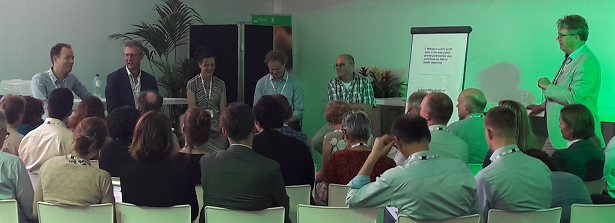Future PPPs: transformative engines contributing to public objectives

The private sector plays an important role in all phases of the food system. It is evident that the Dutch government needs to collaborate with private enterprises amongst others in implementing its food security policy. Yet, for their part in public-private partnerships (PPPs), IOB evaluators were reserved about the contributive role private actors have in the pursuit of ending hunger. The discussion in this breakout session therefore focused on the following questions: To what extent would a not-for-profit PPP leader be helpful in assuring public benefits? What eventual other improvements in PPP set-ups can be made? Or would public investments in an enabling business environment have more effect on Food and Nutrition Security either way?
In view of Dutch food security policy goals, the IOB report posed three major concerns about the current contribution of PPPs. Firstly, public funds transferred to the private sector might not be additional to what the private sector would have invested in anyway. Secondly, in (Dutch) partnerships, private interests risk overshadowing public interests on the ground. Thirdly, PPPs often work with a select group of well-organized farmers who are usually already amongst the “better-off”.
In this session, in which civil society organizations were outnumbered in attendance by private sector actors, the suggestion that private parties should never lead a PPP with a public aim was not supported. “If enterprises bring in large sums of resources, it is not realistic to make it impossible for them to have a leading role in projects”, said panel member Peter Jens (Koppert Biological Systems). Participants also questioned whether non-governmental organizations (NGOs) have the right experience to lead such consortia and whether a PPP led by an NGO would still be attractive enough for enterprises to invest in. An intermediary actor might be the best solution to find the internal balance that is often needed. But the current – and often slightly disappointing – results of PPPs on public aims such as food security should not be blamed on the private or NGO partners involved.
Design of partnerships is essential
Participants agreed that the way PPPs are designed is essential for success. Aside from a good set-up with the right balance between stakeholders within the partnership, setting clear (public) goals was regarded as more essential for the success of a PPP than the choice of actor leading the partnership. Many members of the panel, Jetske Bouma (PBL) in front, emphasized the need for better PPP institutionalization with more focus on local contexts, instead of thinking from a Dutch perspective. This requires a procedure in which public aims are put central, partners are selected, and cooperation is designed accordingly. It also encompasses improvement of partnership learning and evaluation, IOB evaluator Rob Kuijpers underlined. Key needs include more insight into local contexts and continuous monitoring of project assumptions. Embassies, the IOB and knowledge institutes were regarded as important players to obtain this knowledge. Kuijpers’ proposal that projects should have the flexibility to change their design over time, including changing the participating partners gained wide support. Yet participants shared practical concerns such as how can you switch out partners who may have invested substantial sums of money in the project?
Even though operational and tactical flexibility is desirable, it is important to stay strategically focused. Therefore, besides departing from local knowledge, a more holistic analysis of the regional and/or national context the PPP is operating in is vital. With examples of value chain development projects, panel member Guus van Westen (Utrecht University) emphasized the need for a broader view in order to try to prevent collateral damage. Results of such projects can be a success for those included, but excluded actors are for example at risk of being outcompeted and local food prices may rise. At the same time, “everything is important” he added, suggesting that based on wider system analysis specific choices of intervention, and therefore neglecting some other things, are inevitable.
Transformative potential of partnerships
On the whole, PPPs were seen as potential means for transformative sectoral changes. Participants agreed with Sietze Vellema (Partnerships Resource Centre/WUR) who pointed out the distinguishing role of PPPs in combining different sectors to work jointly on development, much more than just being financing instruments. From an entrepreneurial perspective, different partners working on joint, clear public objectives brings attention to large current development challenges, such as youth unemployment and urbanization. In that context, PPPs should choose wisely where they can be most transformative contributing to institutions that could play a role in tackling those large challenges. They should move away from the “old stuff”, as quoted by Jan Ubels (PPPLab), referring to practices where traditional priorities are commissioned from The Hague, which is still seen as current practice by embassy staff members, also present during this session.
Conclusions
Participants agreed that the continuation of Dutch policy investments in PPP instruments is relevant. An additional proposition suggesting policy should just focus on investing in the enabling business environment instead was not eagerly supported, although seen as very relevant. Participants thought that a better understanding and (flexible) institutionalization of PPPs – not their abandonment – is the right way forward, as PPPs offer a unique contribution to development in two ways. Not only do private companies invest in development goals, often with a sustainable, long-term perspective, but they can also make the private sector more inclusive. If PPPs are put to an end, those striving for an inclusive and hunger-free world would likely miss opportunities to enhance food security impact and scale.
Breakout session 3: public-private partnerships
Facilitator: Jan Ubels (PPPLab)
Panellists
- Jetske Bouma (Netherlands Environmental Assessment Agency (PBL))
- Sietze Vellema (Partnerships Resource Centre, Erasmus University Rotterdam/ Wageningen UR)
- Peter Jens (Koppert Biological Systems)
- Guus van Westen (Utrecht University)





